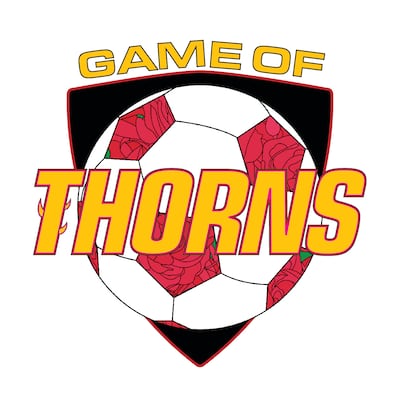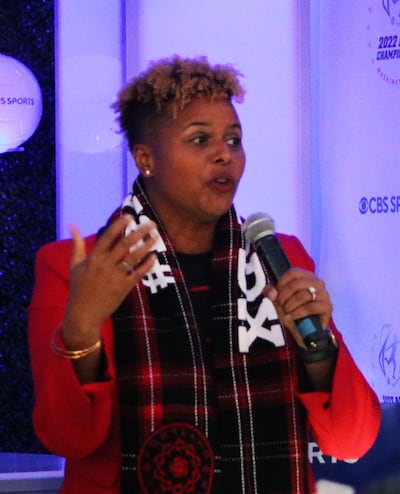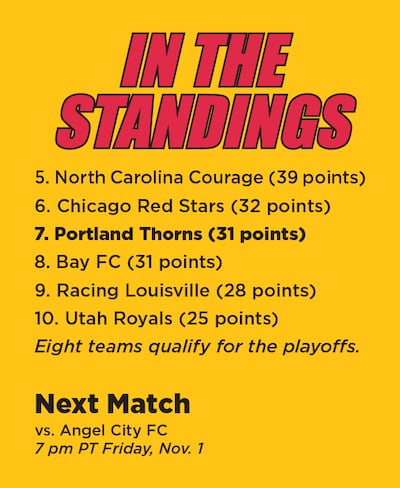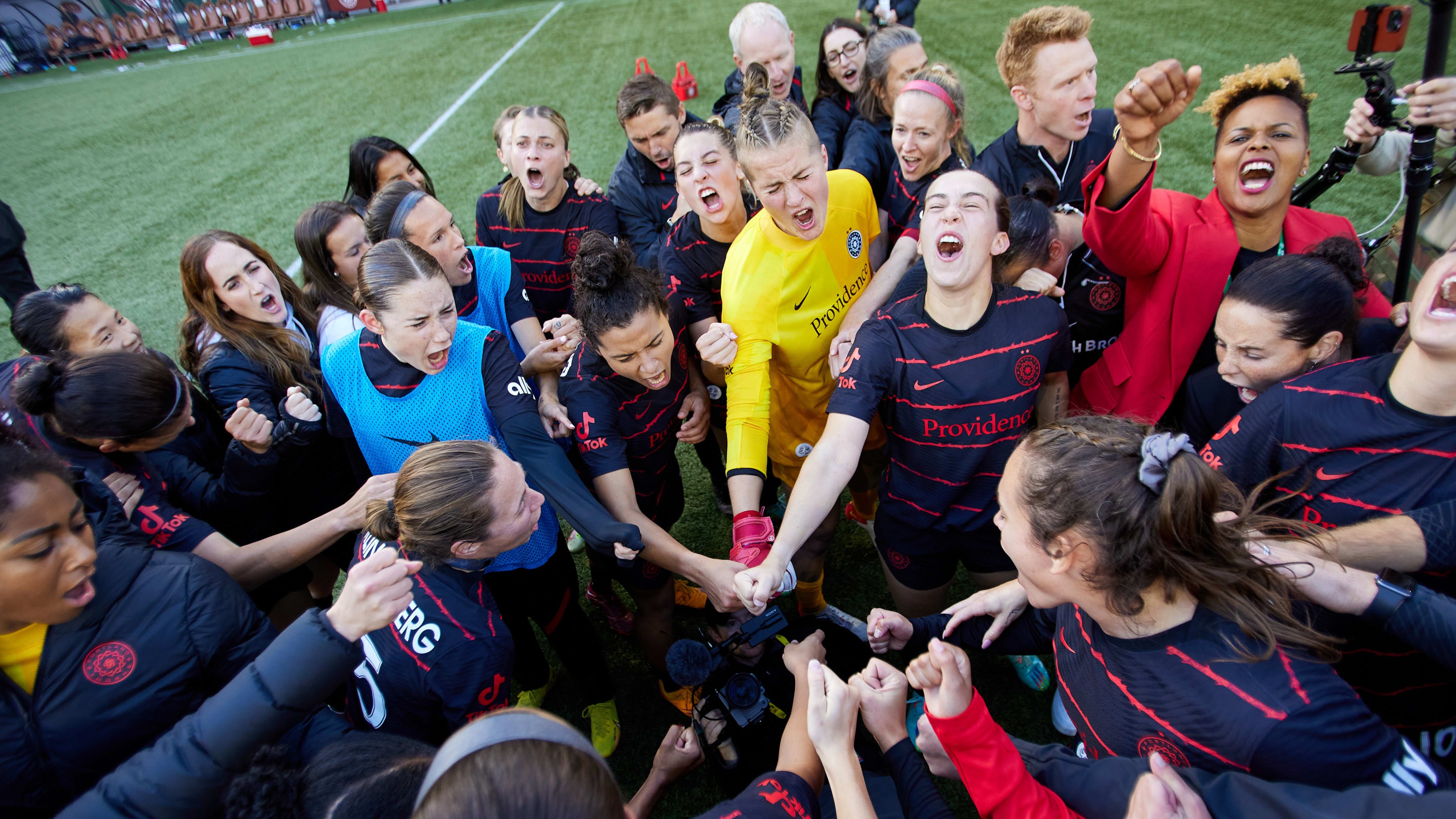The Portland Thorns are still in seventh place after their loss to Racing Louisville on Saturday—inside the cut line of eight teams that make the playoffs—so fans can finally breathe a sigh of relief. Kind of.

There’s still one game left of the regular season. The Thorns can guarantee themselves a spot in the playoffs with a win over Angel City Nov. 1—or hope that other results in the league go their way. Still, the recent win over the first-place Orlando Pride notwithstanding, Portland looks far from a team that can make a meaningful run at a fourth championship this year.
Portland announced Oct. 23 that general manager Karina LeBlanc will transition into a role as the executive vice president of strategic growth development for RAJ Sports at the conclusion of the 2024 season. The role will span across both the Thorns and Portland’s new WNBA team, per an Oct. 9 press release. Prior to joining the Thorns, LeBlanc worked for CONCACAF, the North and Central American soccer governance body, in a role focused on growing the women’s game.

LeBlanc was hired as GM in 2022, as both a familiar face and reformer. Reporter Meg Linehan at The Athletic had recently broken the story about former Portland head coach Paul Riley’s sexual coercion and verbal abuse, and the cover-up perpetrated by former general manager Gavin Wilkinson and owner Merritt Paulson.
It was a relief to see LeBlanc, a decorated name in women’s soccer who defended the Thorns’ net in their inaugural season, step into the role—a familiar face circling the field with her daughter before the Thorns took the pitch.
But LeBlanc’s latest reassignment becomes just the latest in a series of intra-organizational moves that seem to correlate with an identity crisis that we’ve seen Portland go through this year. On the pitch, the Thorns don’t have any more of a cohesive team identity than they had when they kicked off the season seven long months ago. They’ve had some good moments but lacked coherence in many others. Head coach Rob Gale seems to still be figuring out his starting lineup.
Injuries and international breaks—especially in an Olympic year—play a part in that, of course. But front office management also feels lacking: To do their jobs well, the Thorns need a stable coaching staff and a well-constructed roster. Figuring that out amid an ownership transition—the Bhathal family finalized their purchase of the club from Paulson ahead of the 2024 season—can’t be the easiest task in the world. But LeBlanc had three years as GM to set her vision in motion.
And right now, it’s nowhere in sight.
Getting everyone on the field on the same page is hard. It gets harder when ownership keeps shuffling around the managerial team: Portland moved former head coach Mike Norris to a technical director position in April, promoted then-assistant Gale in the interim, appointed Gale to a permanent position in July, and didn’t sign a new assistant coach to fill in Gale’s former role until October.
The Thorns aren’t exactly swift at restocking their brain trust. After the Thorns’ loss to Utah, Gale alluded to the amount of time it took the club to bring assistant coach Stephen Hart on board. “It’s taken a lot longer than we wanted for various reasons,” Gale told the media. It’s an offhand comment about one man’s situation, but taken hand-in-hand with the fact that both Norris and Gale were promoted internally to the head coaching job, I do wonder about Portland’s ability to bring in new, qualified staff.
As for the roster? Not to sound like a broken record, but the Thorns have inked a lot of signings that simply don’t make sense.
Take 2023, when Portland signed Adriana Leon to a short-term contract in April, in order to get her playing time with a club team ahead of the upcoming World Cup. She played in five of the 10 NWSL games for which she was available for a total of 81 minutes. That’s less than a full game of soccer, or 11% of the total time Leon could’ve been on the field for the Thorns. It’s been over a year, and I still don’t understand the logic of signing a player for the explicit purpose of her getting game time and then proceeding not to give her minutes.
Leon’s not alone; Portland’s made several signings this year that seem designed to fill invisible-to-the-public roster needs while ignoring others (like when they lost two midfield stalwarts, Crystal Dunn and Rocky Rodríguez, last offseason and signed only Jessie Fleming to fill that void).

Like everybody says: This is a rebuilding year. Thirteen players on the current roster are new to the team in 2024. But it’s hard to see how the Thorns have intentionally rebuilt as a team. It feels more like Portland’s been trying to force different pieces together with varying levels of success; regardless of how the year concludes, I’m left with more questions about this team than answers.
With LeBlanc stepping out of the general manager role and the Thorns guaranteed their worst league finish in franchise history, I’m not sure anything’s actually been built.
Twelve players on Portland’s roster will be out of contract at the end of the season (including Christine Sinclair, who’s already announced her retirement), which almost certainly spells another season of new faces and roster restructuring. Let’s hope the Bhathals can find—and support—a new general manager who’s up to the task.
This story has been updated from the version that appeared in print, in order to provide additional details about LeBlanc’s new role.

